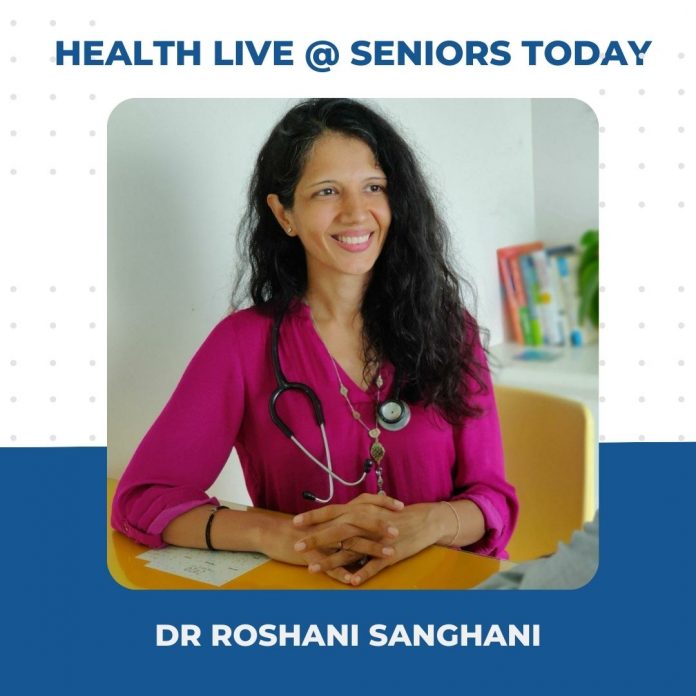On May 29, 20201, Seniors Today hosted the weekly Health Live session with leading endocrinologist Dr Roshani Sanghani where she spoke about tackling diabetes in seniors with lesser medicines.
A little about Dr Sanghani: Dr Roshani Sanghani is a US board-certified Endocrinologist, with over 15 years of clinical experience. Armed with years of hands-on knowledge , she empowers her patients to make lifestyle changes. Her aim is less medication while still achieving better overall health.
Here are takeaways from the session:
Diabetes is an insulin problem first before it becomes a blood sugar problem. In diabetes, the cause for the blood sugar can be due to two different things. There are two different kinds of insulin problems.
Insulin is the hormone that regulates your blood sugar. Insulin plays many other roles in the body as well.
- Diabetes Mellitus Type I: this is also called juvenile diabetes. This is an insulin dependent kind of diabetes. This child will not survive without insulin. These patients present with unintentional loss of weight.
- Diabetes Mellitus Type II: these patients might experience an expanding stomach. Weight gain on the ponch/ truncal obesity. This type of diabetes does not require insulin as a treatment.
You can get a fasting C peptide to see if you have insulin dependent or independent diabetes. You can also get an insulin test, but this is only if you’re NOT taking insulin injections.
Some lifestyle changes that can impressively change the dependence on too many medicines include:
Nutrition: going on low carbohydrate diet
Sleep well
Exercise often
Stress management- can be through spirituality, self love and self care
Intermittent fasting in certain patients
These are some ways and lifestyle modifications that have helped patients in controlling and reversing diabetes and get the patient on lesser medication.
If you completely stop your intake of sugar but do not cut on your carbohydrates, in Dr Sanghani’s experience it does not go away.
In medico-nutritional therapy, it is mentioned that going on a low carbohydrate diet helps diabetes
Goals for diabetics looking for glycemic control include:
Get your sugar and HbA1c under control
No low sugar problems
Less medication for sugar, triglycerides, cholesterol
De-prescribe insulin if it is type II diabetes
Put the patient on a lower insulin dose even if it is diabetes mellitus type I
Inch loss from your waist
Reduce cardiac risk
Improve your immunity especially in the current times. Diabetes and obesity play an important role in the outcome of the Covid disease.
If we talk about diet colas and non-caloric sweeteners, the evidence has come that even diet sodas and drinks are linked with weight gain because people make a switch in their head that I cut out my calories by taking a diet cola so I’ve allowed myself some other calories somewhere else.
And also the fact that the sweet flavour in the mouth tends to set you up for more cravings.
Also, the non-calorific sweeteners and sugar substitutes have an effect on the gut bacteria and flora. There is a possibility that the non caloric sweeteners interact with the bacteria of the gut and lead to more cravings.
Stevia is also one such substitute that is processed. People will tell you that it is better since it is natural. But so is sugar.
Learn to balance your diet for pleasure and for your health.
A very large population in our country believes in the science of Ayurveda and homeopathy. One takes care of the purity of the substances that one is taking. If it is working for you, then you should keep at it. But do not take anything without the knowledge of what is in it. Because when people do that, Dr. Sanghani has seen that these patients come in with toxicities, renal damage.
All medicines come with side effects including hypoglycemic drugs.
We want your fasting blood sugar levels to be less than 100 mg/dl and your post meal sugar to be less than 140 mg/dl, ideally without medication/ least amount of medication.
To put a diabetic patient on intermittent fasting you need to put the patient on a healthy diet, ensure that the diet contains protein, healthy fats and that the carbohydrates are controlled. Your doctor also needs to correct your medication that might be unsafe to fast.
The starting fasting can start with 12 hours, 14, 16 hours. How many times a week varies depending on the body.
If you’re pre-diabetic or newly diagnosed, 16 hours every alternate day works for most.
There is a sugar sensing chip by Albert’s that you can wear on your arm to check your sugar levels without pricking your finger. It is not exactly the same in terms of accuracy as a drop of blood but it will show you patterns and trends.









Can you give me details as to how to consult Dr Roshani.
This was the link shared by Doctor – https://bit.ly/2R3eu6N
Once you fill up the form, their team will contact you.
Comments are closed.